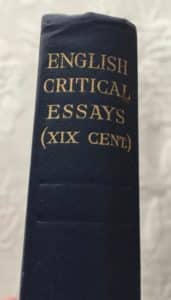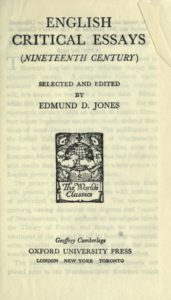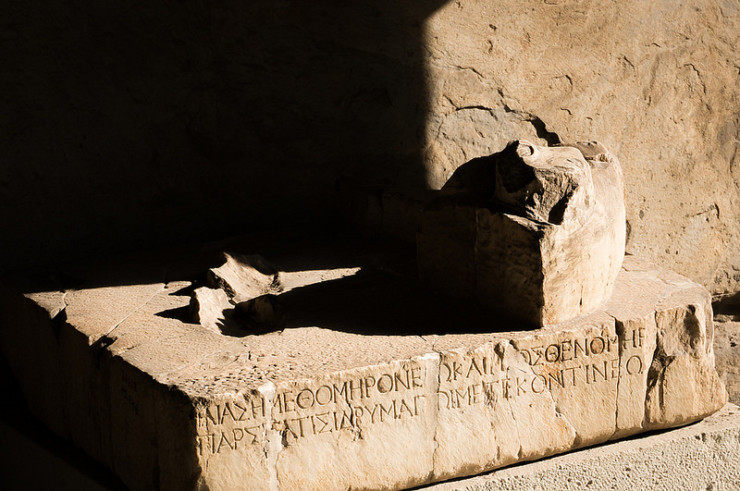In 1916, Oxford University Press published English Critical Essays: Nineteenth Century, selected and edited by Edmund David Jones. It was volume 206 in “The World’s Classics.” This kind of series was once common, especially in the 19th and early 20th centuries, in both Britain and North America. The rise of the middle class and the explosion in literacy fueled the printing of sets like “The World’s Greatest Literature,” “The World’s Greatest Speeches,” and similar works.
These kinds of books were also used in high school and college classes. I’ve seen many of similar size and content that bear educational inscriptions. These works include essays, poetry, short stories, and sometimes single works like a Shakespeare play.

This particular work was reprinted at least 10 times before the edition I have, published in 1943. And it was republished several times afterward. The last publication date I can find online is 1971—so it was a book that had a pretty decent run from its original publication date.
It’s a small book, just four by six inches. The critical essays Jones included are all about poetry, positioned in chronological order. The essayists include some of the most famous names in poetry, criticism, and political philosophy: William Wordsworth, Samuel Taylor Coleridge, William Blake, Charles Lamb, Percy Bysshe Shelley, William Hazlitt, John Henry Cardinal Newman, Thomas Carlyle, Leigh Hunt, Matthew Arnold, John Ruskin, John Stuart Mill, a few other British writers, and two Americans: Ralph Waldo Emerson (writing on Shakespeare) and James Russell Lowell (an essay on Wordsworth).
Wordsworth writes on poetry and poetic diction. Coleridge writes a response to that essay and has one of his own, “Metrical Composition.” Shelley writes a defense of poetry (it needed defending back then, too), while Leigh Hunt attempts to define poetry. The other writers consider Shakespeare, Dante, Tennyson, Robert Browning, Coleridge, and what subjects were appropriate for poetic composition.
Imagine telling a poet today that his or her subject is not appropriate for poetry.
The essay I like best is by William Blake, “The Canterbury Pilgrims,” composed in 1809. It is an atmospheric and character study of Geoffrey Chaucer’s great poem and even a bit of Chaucer himself. Here’s a paragraph that gives an example of Blake’s prose style:

My volume, purchased at a used book sale, bears a rather slight inscription: “Marilyn Scott, Manly Annex 9, 1946.” I did some cursory searching online but couldn’t identify either the name or the location (a new wing of a museum in a suburb of Sydney didn’t seem to fit). But it suggests a student, likely in England or one of the Dominion countries, using the book for its intended educational purpose. Ms. Scott or a later owner made very minor annotations—a checkmark by the John Henry Cardinal Newman essay in the table of contents, and a few underlined passages in the essay by John Stuart Mill, “Thoughts on Poetry and Its Varieties,” written in 1833 and revised in 1859.
English Critical Essays: Nineteenth Century is a small volume, but it was used in classrooms for almost 60 years. It provided a critical look at poetry and its practitioners. It also provides a window to a world long gone.
Photo by Juan P. Verni, Creative Commons, via Flickr. Post by Glynn Young, author of the novels Dancing Priest and A Light Shining, and Poetry at Work.
__________________________

“I require all our incoming poetry students—in the MFA I direct—to buy and read this book.”
—Jeanetta Calhoun Mish

Bethany R. says
“This kind of series was once common, especially in the 19th and early 20th centuries, in both Britain and North America. The rise of the middle class and the explosion in literacy fueled the printing of sets like ‘The World’s Greatest Literature…’” How interesting, Glynn.
Any theories on why the previous owner might checkmark the essay by John Henry Cardinal Newman? I’m always intrigued by used books’ previous lives.
Glynn says
I suspect it was to note a classroom assignment.